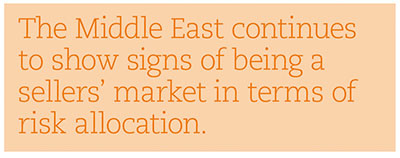While conventional financial transactions in the West are in turmoil, there is a refreshing burst of optimism in the world of Islamic finance, according to Arti Sangar, partner in charge of Diaz Reus & Targ’s Dubai office. She takes a look at the challenges in an evolving sector.
 Key principles There is no formally accepted definition of Islamic finance. Islamic finance transactions are based on Islamic principles and jurisprudence (together, the Shari’ah) which are derived from the primary sources of the Qu’ran and the Sunna. A fundamental principle of Shari’ah is that a physical asset or tradable commodity should underpin each transaction. As a result, Islamic finance transactions are either asset-based or asset-backed. In contrast, conventional banking generally relies on a contractual liability to recover monies exchanged as loans and deposits, together with an interest margin for the lender. While Islamic and conventional financing may initially appear incompatible, the structural issues involved are not insurmountable. One of the major differences between conventional and Islamic finance systems is the notion of interest, which is prohibited under the principles of Shari’ah law. This, however, does not suggest that an Islamic bank acts as a charity institution. In Islamic finance, financing of industries deemed unlawful by Shari’ah law such as alcohol, tobacco, weapons, pork and gambling are also prohibited. Contracts in which one party is regarded as having gained unjustly at the expense of another are also considered invalid. Contracts which contain uncertainty, particularly in regard to one of the fundamental terms of the contract such as the subject matter, price or time for delivery, are also considered invalid. The test is whether something has been gained by chance rather than by productive effort. To ensure adherence to these underlying Islamic principles, most Islamic institutions are governed by a supervisory board of Muslim scholars who analyze the institution’s methods and operations. The challenges A second obstacle for Islamic finance has been the risks associated with the shortage of qualified Shari’ah scholars in the Islamic financial industry. Currently, financial advisors, Islamic financial institutions and their Shari’ah committees are grappling with how to structure Islamic finance to properly integrate with conventional finance. The end result has been the development of a cumbersome and document-heavy structure that in many respects mimics conventional financing. There is clearly opportunity for more education and training and some positive steps are now being taken, including university degrees and professional training courses in Islamic financing. There is a lack of a legal and regulatory framework for dispute resolution, especially in cross-border transactions. In contracts for Islamic transactions, the enforceability of terms and conditions depends on the governing law. In the case of a dispute, it is unlikely that a court located in a commonwealth country will determine a verdict based on Shari’ah law. To mitigate this risk, contracts have to be written carefully to minimize potential disputes. Another challenge is the lack of tax framework for Islamic products leading to uncertain tax outcomes and sometimes even double taxation, as well as the prohibition of certain Islamic products. A number of countries are revising their tax, legal, and regulatory frameworks to attract Islamic finance. Lastly, Islamic finance presents an unusual problem because there is neither any specific legislation regulating it, nor is there sufficient relevant case law to address these issues. Shari’ah law is not a codified body of law, but rather a set of practices based on various interpretations. Furthermore, Islamic finance in some countries and their various business models have not yet been tested in a severe economic or market downturn. What the future holds asangar@diazreus.com To download the ASIAN-MENA COUNSEL Article Click here |
IN-HOUSE OPINION: If you are an in-house counsel and you have a comment or an opinion you’d like to share either on this article or its subject matter, contact us at: inhouse@inhousecommunity with the article title in the subject line, stating clearly if you wish your comments to remain ‘Private’ or ‘Anonymous’.



















